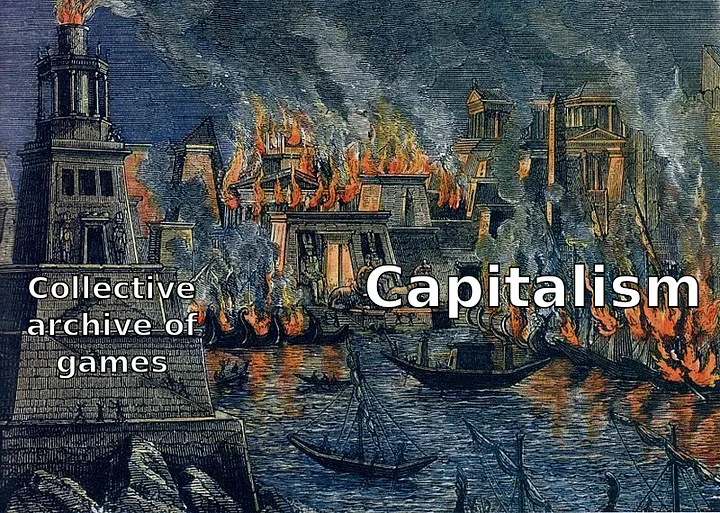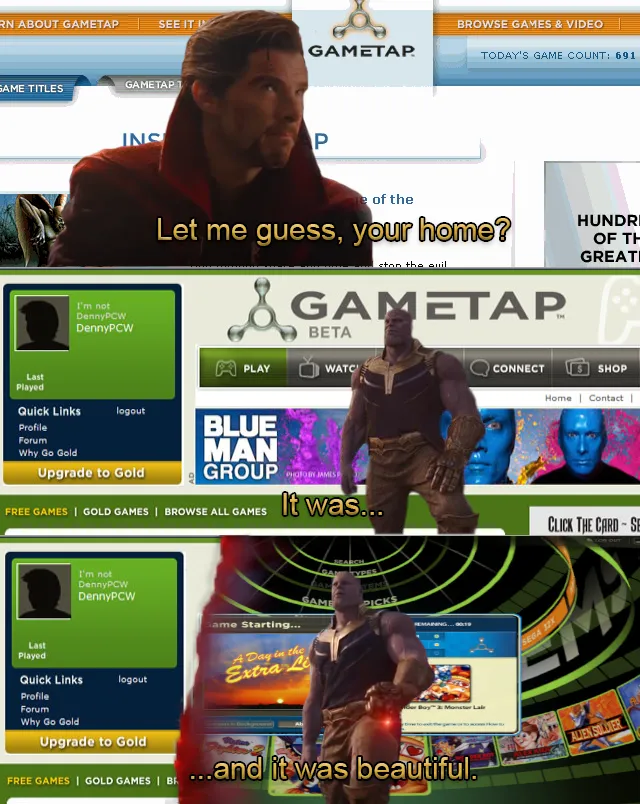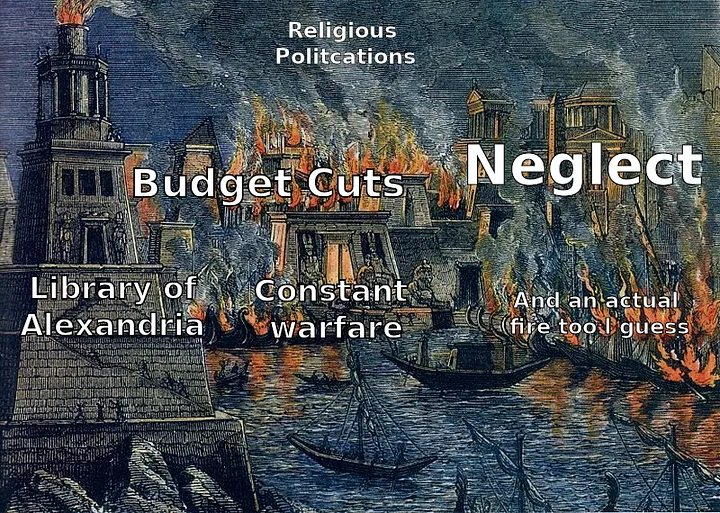Emulation, Piracy, and the Modern fire of Alexandria
Posted 9/1/2024
In the modern era of video streaming, almost all media new and old is within reach. All it costs to watch old episodes of Lizzie McGuire is access to a Disney+ subscription. The streaming giant isn’t only good for classic Disney Channel series. Disney+ is using the full force of the media repertoire Disney has amassed during its decades long journey towards being the only major media conglomerate.
This serves as a sign. Not only of how Disney has found streaming success after joining the party at the absolute last second, but how we’ve entered a new age of archives. Disney+, Netflix, Hulu, and other similar sites prove that we can preserve and save our precious media on the internet for all to enjoy. Sure, it may cost a small monthly fee that will balloon in a couple of years, but that’s the cost of business. Not like you can just have some publicly funded cloud to keep all of our cultural keepsakes. Some archive of the internet is a pie in the sky ideal only radical lefties could dream of. The current consensus is that if you want to experience old movies, shows, or video games from your childhood, you better have the cash to do so. Enjoying anything without paying for it is piracy. Everyone knows that.

But how does one enjoy their old video games? You can’t just pop a PS1 disk into your PC and start up a good ol’ game of Crash Team Racing. Technology doesn’t really work like that. What works similarly to that is emulation. Emulation is the process by which software is used to copy another kind of software or hardware. Most users associate emulation with video game software, but it can also be used for older OSs, retro mobile phones, or any kind of software really. If you’ve ever played a game on hardware it wasn’t originally made for, then you probably have emulation to thank for that. Taking a game made for arcades in the 90s and fully rebuilding it to play on PS4 would be far too much work, so emulation is a nice shortcut. While emulation has been a great way for folks to enjoy games of the past, there’s been one glaring problem with it. Some people have been using emulation, or their communities, to enjoy games for FREE, and we know what that means.

So why would someone enjoy something for free and rob the creators of their hard earned money? Well one obvious reason might be just because they can and don’t feel like spending the money. We can’t avoid that fact. Another reason for piracy might be that there’s not really another option to enjoy some things in a legal way.
When Kissanime shut down earlier this year, many international fans mourned the loss because there wasn’t a way to enjoy many of those series through legal means. Even though streaming SHOULD make content available to anyone with an internet connection, the sad truth is that streaming sites need to make agreements with publishers for rights to stream in certain countries. And much like high speed internet service in rural areas, streaming sites won’t bother to pay for rights to stream media in your country if it’s not profitable enough.
Video game ports and re-releases work similarly. While Persona 4 Golden had amazing sales after its official steam release, not every game remaster is exactly a slam dunk. In late December 2019, Katsuhiro Harada, producer of the Tekken series, tweeted that Xenosaga had a remaster planned, but the project was canned because a market analysis didn’t find it would be profitable.
From a business standpoint, that makes sense. Even if they have the means to port old games to new systems, it’s gonna cost them money. Marketing, quality assurance, and getting the game on shelves (physical or digital) all costs money. That’s assuming they don’t do the extra work of upscaling graphics or adding extra content and features. The unfortunate fact of the matter is that from a capitalist standpoint, it makes perfect sense that not all of the old games we used to love will be legally available. Every port is a gamble, and not everything will just bring instant money. The gaming library of Alexandria is burning, and capitalism is the fire. A voluminous amount of software is lost to history because it’s impossible to make a profit from it.

But what if capitalism can be the answer? What if there was a service for players to legally stream their favorite classic games from their computer (or other devices)? If there was a Netflix for gaming, then the crisis of lost games could be averted without dipping into the socialist sin of piracy. Just bundle a bunch of classic games together that are accessible by the internet, and have users pay a monthly fee to access them Wouldn’t that be great if that were a real thing? Well, I’ve got good news and bad news.
The Rise and Fall of Gametap
GameTap was the Netflix of gaming when Netflix was still shipping DVDs by mail. It’d be fair to call Netflix the GameTap of movies. Not only because GameTap was established at least a good year or two before Netflix offered video streaming to subscribers, but even for its medium, GameTap was much more fully functioned than Netflix could even hope to be. GameTap had a vast collection of games from more than 20+ different consoles and systems. In addition, GameTap also had extra video content and you could play certain games over the internet with other users. GameTap even had original games that were exclusive to the platform for a limited time, such as the Sam & Max series. GameTap wasn’t just a place to play games old and new, it was an entire media portal.

Unfortunately, they may bitten off more than they could chew. GameTap eventually shut down their editorial section. They tried bringing in new customers through different methods like lowering the price and offering a free-ad supported selection of games for users that didn’t want to subscribe. GameTap was sold to Metaboli, a French gaming company, in 2008. As of 2017,the website has shutdown completely and hasn't been back up as of this writing.
GameTap was the one place where capitalism was supposed to step in and solve the problem of archiving classic games, but even then it ended in failure. There have been other ventures into classic games and streaming. Playstation Now and Nintendo Switch Classic online services have had better success than GameTap, but their catalogs are reserved to games released on those companies’ respective consoles. Even then, there are gaps in their catalogs. Capitalism has been used as an answer to the problem of preserving games, but it isn’t the right one.
Pirates: Footsoldiers of Preservation
Pirates are the only ones who will save us from the crisis of lost software. Even with good games, developers are known for losing their source code. A couple of famous examples are...
And it’s reasonable that this happened for the time. Former Square Enix President and CEO Yosuke Matsuda had an interview with Game Informer, and described the difficulty in preserving old games.
“It’s very hard to find them sometimes, because back in the day you just made them and put them out there and you were done — you didn’t think of how you were going to sell them down the road.”
Dedicated fans are better at preserving data for precious games than their corporate owners. Even in recent years, when a demand for remasters and remakes has been growing, There are major gaming corporations not dedicated to making old software accessible. Sometime in late August 2020, a Ubisoft support page stated that the PS5 will not be backwards compatible with games from the first three PlayStation consoles. Now this has slightly changed with the new Playstation Plus subscriptions that allow users to access some classic games on PSN, this still won't allow folks that have their physical classic games to play them on the PS5. There was limited support for select PS4 games and the selection grew. Unfortunately, thanks to digital rot, even the original hardware will lose its ability to run old games, and that’s in the best-case scenario where neglect or other perils don’t affect how well a console runs.
If we limit our scope of acceptable emulation to actions that fit within a capitalist framework of only paid software is acceptable software, then gaming history will miss out on a lot of gems that lack commercial viability. There are many great games from history that would never see the light of day, just because many companies that own the original rights are now defunct, or successful companies that could rerelease these games -EVEN AT A PROFIT- don't because, once again even if a profit is possible, it wouldn't make them enough money to rerelease them. All the while, it's still punishable by firing squad to load up Cookie's Bustle on a flash drive.
(Editor's note: I know that the MvC collection is on the way, and for this specific example, WHICH WAS VERY STRONG AT THE TIME, the following paragraph will no longer be true about a week or so after this is posted, but it still holds as a good example, so just imagine I said the dot hack series here.)
Even Marvel vs. Capcom 2, one of the greatest fighting games ever known, can’t be enjoyed legally in a way that pays the Capcom or Disney companies. The game is no longer in physical print, nor is it on the PSN or Xbox online marketplaces. So if you want to play it legally you can either, A) find a physical copy in the wild or Ebay, or B) find a friend with a PSN or Xbox account that already bought the game and re-download it to a PS3 or Xbox360 system. Even if you had all the money in the world, there isn’t a realistic way to enjoy MvC2 within the letter of the law and give Capcom and Disney a nice payday.
The funny thing is that there have been situations where piracy has helped the gaming industry overall. Whenever Nintendo or Sega, or Sony or whoever want to make a mini console, then they’ll usually use emulators (AKA pirate technology). Both the SNES and PS1 mini consoles use open source emulation software to power those systems. If it weren’t for piracy, then those emulators wouldn’t have progressed and updated to be usable enough for a mass market release.
Another favorite case of mine is when Square Enix decided to do a remake of Trials of Mana, or Seiken Densetsu 3 as it’s known in Japan. While the first two games in the Mana series were released in English, Trials of Mana was not. Despite that, the game still has a great reputation overseas thanks to piracy. Open source translation and bootlegging allowed this game to have an audience where it otherwise didn’t and made it easier to market the remake to a Western audience.
/Update%2021/1-SD3_20_1.png)
What Should Be Done
What I want you, the reader and anyone else involved in gaming, to know is that free software archiving can serve to increase profits if used properly. If emulation were decriminalized and more open to the public, it would be easier to obtain market data on what people are playing and how often they’re engaging with it, it can give developers an opportunity to understand what players are actually engaging with instead of just relying on twitter users looking through nostalgia goggles. Sure Capcom could take people for their word that they want more games like Third Strike, but they could check the numbers to see that Alpha 3 has better numbers.
We don’t have to choose between open access or a profitable games industry; it’s possible to have both. Software archivists can help big gaming, and big gaming can help the preservation of old games. Keeping as many games in our collective memory is important not only for enthusiasts, but these old games can give newer developers ideas upon which they can make better games. The opportunity cost of free access to old games is whatever money you could make selling some remastered version of a 20 year old game for the 20th time in a row, but what you, a player, a developer, or gaming enthusiast in general, can get out of it is so much more valuable.
The Truth of Alexandria and Our Current Situation
I want to return to the Library of Alexandria. I made a lot of metaphors about how the loss of software due to capitalism is like how it burned back in history, but the truth is that a fire didn’t kill the library of Alexandria, it was budget cuts and surrounding strife that fell the library of Alexandria.
The removal of scholar stipends kept intellectuals from visiting the library at the frequency they once did. Judeo Christian politicians replaced much of the old Greek scrolls with material they felt was more appropriate. The surrounding area was also home to many armed conflicts, which isn’t something scholars tend to be fans of. There was a fire from conquering forces that eventually brought the library to an end, but it had sunken so far from its previous prestige, that the fire wasn’t the worst thing to happen to it at that point.

Knowing what truly destroyed the Library of Alexandria is important because many of our archiving institutions are facing similar troubles. We live in an age where information is everywhere, but information literacy is not a highly valued skill. There are right-wing dickheads and their unwitting agents trying to censor and defund libraries to keep stop the trans agenda. We have misguided pundits suggesting Amazon replace our public libraries. It's very bleak these days. Things aren't hopeless, but I don't feel things got too better since the last time I wrote this article.
If we truly care about maintaining our archives, whether those archives be video games, business software, or Greek scrolls, we have to invest in protecting those archives for archives’ sake. We can’t prioritize profits if we want to make sure our great history of gaming is available for players to enjoy many generations from now.